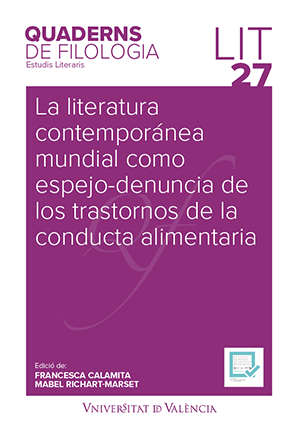Cruel Optimism and Obsessive Appetites in Leïla Slimani’s Novels
DOI:
https://doi.org/10.7203/qdfed.27.25731Keywords:
trauma, addiction, appetites, crisis ordinariness, violence Abstract
Abstract
This article explores obsessive appetites in Leïla Slimani’s Chanson Douce [Sweet Song], translated into English in the UK with the title Lullaby and in the US as The Perfect Nanny, and Dans le jardin de l’ogre [In the Ogre’s Garden], translated as Adèle. I draw on Lauren Berlant’s ideas on the connections between obsessive eating and obsessive sexuality in Cruel Optimism, highlighting how in Slimani’s work, eating disorders and sexual compulsions constitute repeated enactments of failed attachments and are triggered by a form of systemic trauma (which Berlant calls ‘crisis ordinariness’) rooted in sociocultural alienation. The desperate quest for intimacy in Chanson douce and for anti-intimacy in Dans le jardin de l’ogre leads to self-destruction, figured in self-starvation, in damaging sexual relations, and ultimately in murder. The reader, I argue, gets caught up in the destructive repetitions and in the desire to move beyond them to some sort of satisfying ending, which in these texts entails the brutal silencing of female desires and agency (written into the narratives from the very beginning). Reading here is thus shown to be bound up in the violence of cruel optimism and its obsessive appetites.
 Downloads
Downloads
Downloads
Published
How to Cite
-
Abstract431
-
PDF (Español)533
Issue
Section
License
 Este obra está bajo una licencia de Creative Commons Reconocimiento-NoComercial-SinObraDerivada 4.0 Internacional.
Este obra está bajo una licencia de Creative Commons Reconocimiento-NoComercial-SinObraDerivada 4.0 Internacional.
Authors who publish with this journal agree to the following terms:
- Authors retain copyright and grant the journal right of first publication with the work simultaneously licensed under a Creative Commons Attribution License that allows others to share the work with an acknowledgement of the work's authorship and initial publication in this journal.
- Authors are able to enter into separate, additional contractual arrangements for the non-exclusive distribution of the journal's published version of the work (e.g., post it to an institutional repository or publish it in a book), with an acknowledgement of its initial publication in this journal.
- Authors are permitted and encouraged to post their work online (e.g., in institutional repositories or on their website) prior to and during the submission process, as it can lead to productive exchanges, as well as earlier and greater citation of published work (See The Effect of Open Access).




